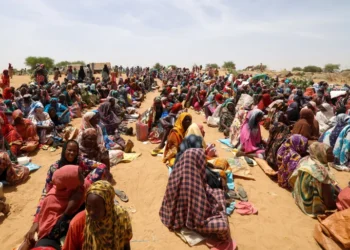The Taliban today rejected claims by freed Canadian hostage Joshua Boyle that his kidnappers had killed his child and raped his wife during the family’s captivity, saying the woman had a “natural miscarriage”.
Boyle and his American wife were seized by the Taliban while hiking in Afghanistan in 2012, and then turned over to the group’s affiliated militant Haqqani network in Pakistan.
The couple and their three children born in captivity were freed Wednesday in a Pakistani military operation triggered by US intelligence and are now back in Canada.
After landing in Toronto on Friday Boyle accused his captors of killing his baby daughter and raping his wife – accusations which the Taliban said were “fake”.
In a statement read on his arrival Boyle condemned the Haqqani network’s “stupidity and evil of authorising the murder of my infant daughter” in “retaliation for my repeated refusal to accept an offer that the miscreant of the Haqqani network had made to me, and the stupidity and evil of the subsequent rape of my wife”.
Taliban spokesman Zabihullah Mujahid said Boyle and Coleman were never separated during their captivity, “precisely due to the fact that the mujahideen did not want to incite any suspicion”, but he admitted a baby had died.
“During a period of detention an incident did take place when the woman became ill. The area was remote, no doctors were present and due to this severe condition, the woman had a natural miscarriage of a girl,” Mujahid said in a statement.
“The allegations floating around in the media have nothing to do with the reality because the said people are now in the hands of our enemy.”
The Haqqani group is headed by Sirajuddin Haqqani, who is also the Afghan Taliban’s deputy leader.
The faction has long been suspected of links to Pakistan’s shadowy military establishment.
Providing few details, Boyle said the death of his daughter and his wife’s rape occurred in 2014.
That was two years after he and his “heavily pregnant” wife, were kidnapped in a remote Taliban-controlled area of Afghanistan.
He said they were in the war-torn country as “pilgrims” helping poor villagers when they were captured.
Taliban rubbishes freed Canadian hostage's allegation of raping his wife; says child died due to miscarriage
0
Leave a Reply Cancel reply
BROWSE BY CATEGORIES
- #SmartLagos
- Basketball
- Beauty
- Boxing
- Breaking
- Business
- Careers
- Crime
- Default
- Education
- Entertainment
- Event
- Fashion
- Featured
- Football
- Gaming
- Gist
- Golf
- Health
- Inspirational Patience
- Interview
- Investigative
- Law
- Lifestyle
- local
- MetroMan
- MetroPerson
- metroplus
- MetroProfile
- Movies
- Music
- MUSIC
- New Music
- News
- nolly wood
- Nollywood
- Novels
- Odawood
- Opinion
- Parenting
- Photos
- Politics
- Press Release
- Relationship
- Religion
- Scandal
- Security
- Sex
- Society
- Sports
- Technology
- Travel
- TV
- Videos
- Weird
- Wheels
- World
BROWSE BY TOPICS
#COVID19Nigeria
#EndSARS
Adams Oshiomhole
Akinwunmi Ambode
APC
ASUU
atiku
Atiku Abubakar
Big brother Naija 2020
boko haram
Buhari
Bukola Saraki
CBN
court
COVID-19
davido
ECOWAS
Edo Election
Edo State Election
efcc
Featured
FG
Goodluck Jonathan
gunmen
INEC
Kayode Fayemi
Lagos
Lagos State
MohBad
Muhammadu Buhari
NCDC
NDLEA
Niger
Nigeria
NLC
Obaseki
Otunba Gbenga Daniel
PDP
police
President Buhari
Sanwo Olu
senate
tinubu
wike
Yemi Osinbajo
© Copyright MetroNews NG 2020. All rights reserved.








